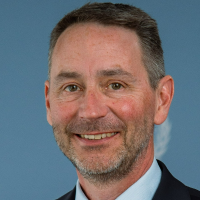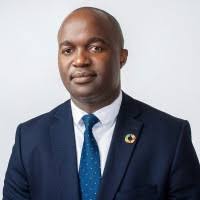WSIS Action Line C7: E-business and the Global Digital Compact
International Trade Centre, Universal Postal Union, UN Trade and Development
Session 235
Despite progress in the adoption of e-business worldwide over 20 years since WSIS, there is a continuing divide in the digital readiness of developed versus developing countries. The Global Digital Compact, as an expected outcome of the coming Summit of the Future in September 2024, offers an opportunity to guide policies that could accelerate a reduction of that digital divide and allow micro, small, and medium-sized enterprises in developing regions to participate more equitably, and benefit more, in the digital economy. This session will explore the intersection of the WSIS e-business action line with the issues articulated in the current draft of the Global Digital Compact.

Mr. James Howe is Head of Digital, Markets and Connectivity at the International Trade Centre, a joint agency of the World Trade Organization and the United Nations. ITC’s mission is to enable small-business export success by connecting small and medium-sized enterprises in developing countries and transition economies to the global trading system. James and his team work to enable enterprises to activate their marketing strategies through branding, sales and marketing programmes and e-commerce.

Mr Torbjörn Fredriksson heads the E-commerce and Digital Economy Programme at the UN Conference on Trade and Development (UNCTAD). The Branch’s work covers the Digital Economy Report, the eTrade for all initiative, eTrade for Women, the UNCTAD eWeek, various capacity-building activities, and the Intergovernmental Group of Experts on E-commerce and the Digital Economy. Mr Fredriksson joined the UN in 2000.

Ms. Allison St. Brice is the Chargé d'Affaires a.i. at the Permanent Mission of Trinidad and Tobago to the United Nations in Geneva.

Mr. Juan Moroni is Digital Transformation and Policy Expert at the Universal Postal Union (UPU), the United Nations specialized agency for the postal sector. The UPU is the primary forum for cooperation between postal sector stakeholders, fulfilling an advisory, mediating and liaison role, and providing technical assistance to its members. Juan is also the co-founder and lead of Connect.post, a UPU initiative to leverage the postal network to advance digital, social and financial inclusion, and to foster sustainable socio-economic development.

Bernard Banda is currently Director for Economic Regulation and Consumer Protection at the Zambia Information and Communication Technology Authority, the regulator of Information and Communication Technologies in Zambia. He is responsible for overseeing the Authority’s regulatory mandate related to monitoring developments in the sector, managing competition, consumer protection as well as generating research evidence for decision making. He has been involved in the development of various policy and strategy documents relating to the ICT sector. Bernard is also responsible for coordinating all compliance programmes for the ICT sector undertaken by ZICTA. He holds an MSc in Economics and BA in Economics/Mathematical Statistics as well as various professional certifications.

Ms. Hilda Moraa is an eTrade for Women Advocate for 2024-25. She is an award-winning serial fintech entrepreneur, a Software Engineer by training, and author. She has more than 15 years of entrepreneurship experience in Fintech and working with multinationals supply chain firms to develop innovations across Africa. In 2015, her first tech start-up was the first recorded multi-million dollar exit in the Kenyan ecosystem. She is currently the Founder & CEO of Pezesha, a holistic digital financial infrastructure powering working capital and credit scoring to SMEs and institutions across Africa. Hilda also served as a board advisor in various innovation initiatives under the Ministry of ICT such as Konza City.
-
 C7. ICT applications: benefits in all aspects of life — E-business
C7. ICT applications: benefits in all aspects of life — E-business
The WSIS Action Line C7 on e-business (ICT applications) seeks to improve the access to, and use of, digital technologies for business purposes, in particular by micro, small, and medium-sized enterprises in developing economies so that they can reap the benefits of the digital economy.
-
 Goal 1: End poverty in all its forms everywhere
Goal 1: End poverty in all its forms everywhere
-
 Goal 2: End hunger, achieve food security and improved nutrition and promote sustainable agriculture
Goal 2: End hunger, achieve food security and improved nutrition and promote sustainable agriculture
-
 Goal 5: Achieve gender equality and empower all women and girls
Goal 5: Achieve gender equality and empower all women and girls
-
 Goal 8: Promote inclusive and sustainable economic growth, employment and decent work for all
Goal 8: Promote inclusive and sustainable economic growth, employment and decent work for all
-
 Goal 9: Build resilient infrastructure, promote sustainable industrialization and foster innovation
Goal 9: Build resilient infrastructure, promote sustainable industrialization and foster innovation
-
 Goal 17: Revitalize the global partnership for sustainable development
Goal 17: Revitalize the global partnership for sustainable development
The WSIS Action Line C7 on e-business has been mapped to Sustainable Development Goals 1, 2, 5, 8, 9, and 17. In the goal to end poverty (Goal 1), e-business can improve the equal access of men and women to economic resources and e-commerce activities; it can facilitate remittances and mobile payments. In the fight against hunger (Goal 2), the use of ICT by rural enterprises can improve the productivity of small-scale food producers and help build local and export markets for their products. E-business can support gender equality (Goal 5) by empowering women's entrepreneurship through ICT and in the ICT sector. The e-business action line also supports economic growth through the ICT sector and offers opportunities for decent job creation (Goal 8), entrepreneurship, and the formalization of micro, small, and medium-sized enterprises. E-business also facilitates access to financial services and market information (Goal 9), as well as to exports from least developed countries through e-commerce (Goal 17).
- The eTrade for All initiative : offering development solutions for digital readiness.
- The ITC Digital Moonshot initiative: helping to get more MSMEs online and engaged in digital trade and entrepreneurialism.
- The UPU Connect.post initiative : connecting every post office to the Internet by 2030, to bring meaningful digital inclusion of businesses and citizens in the communities they serve.
- The UNCTAD E-commerce and Digital Economy Programme : enhancing the capacities of developing countries to harness the evolving digital economy for more inclusive development.
- Webcast: The e-business action line and the Global Digital Compact